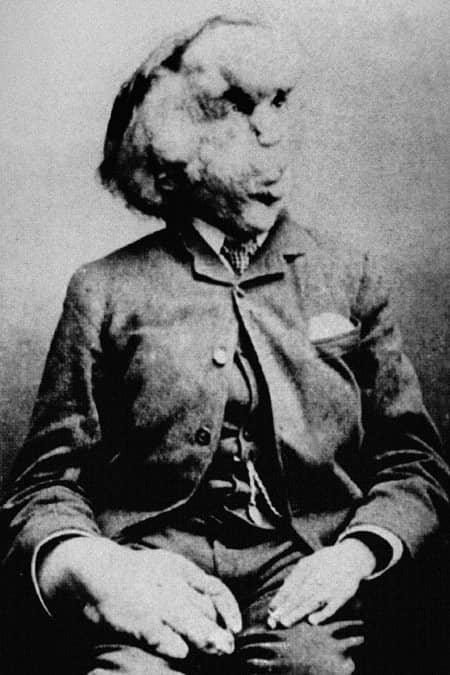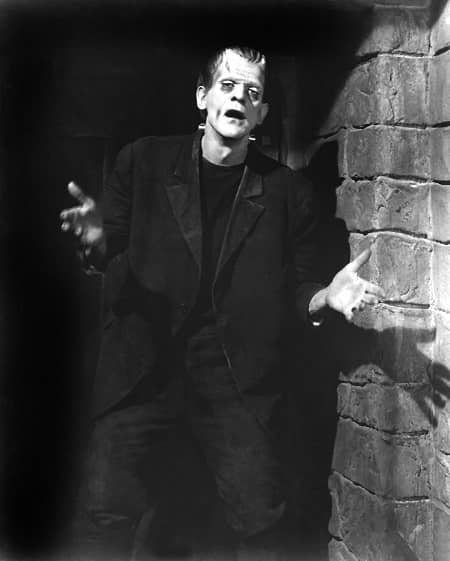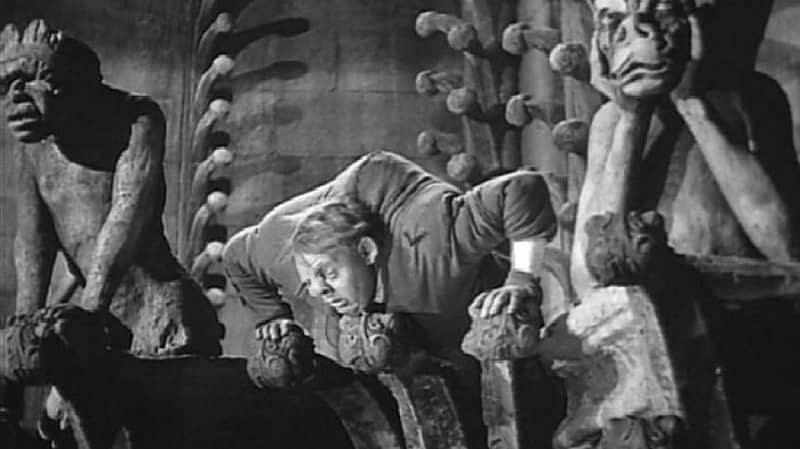Black Gate Online Fiction: An Excerpt from “Withering Blights,” featured in Lovers in Hell
By Joe Bonadonna
This is an excerpt from “Withering Blights,” by Joe Bonadonna, featured in Lovers in Hell, edited by Janet Morris and Chris Morris. It is presented by Black Gate magazine. It appears with the permission of Joe Bonadonna and Perseid Press, and may not be reproduced in whole or in part. All rights reserved. Copyright 2018 by Joe Bonadonna.
Doctor Victor Frankenstein, whose brain resides inside the skull of his infamous Monster, is back to his old tricks again. After he and Quasimodo finish their tour of duty in the Mortuary, where they assisted the Undertaker and Gorgonous, his Deputy Assistant, in resurrecting and reassigning the Damned, and sending them back out into Hell again, they return to the Golem Heights and to their home, Goblin Manor. At first it appears that it’s going to be just another hellish day in New Hell City, until one of the most celebrated figures of Victorian England makes an appointment to see the mad doctor and his hunchbacked assistant…
“Withering Blights”
“Lovers and madmen have such seething brains,
Such shaping fantasies, that apprehend
More than cool reason ever comprehends.
The lunatic, the lover, and the poet
Are of imagination all compact.”
— William Shakespeare, A Midsummer Night’s Dream
 Somewhere at the far edge of the Golem Heights, surrounded by jagged rock and malodorous heath, high on a cliff overlooking the unclean waters of the Vile River, stands a dark-shadowed mansion worthy of Poe. Two twisted, skeletal trees guard either side of the broken stone steps leading to the black doors of its entrance. Soulless and barren, with an irredeemable dreariness, this estate perches on the precipitous brink of that lurid tarn. Two large, rectangular windows on its third and top floor, one on its middle floor, and a double-row of smaller windows at ground level, all brightly lit with golden light from within, give the building the look of a grinning skull. A pallid green fungus crawls over gray walls and eye-like windows, adding to the bleak house’s moldering state of disrepair and air of insufferable gloom.
Somewhere at the far edge of the Golem Heights, surrounded by jagged rock and malodorous heath, high on a cliff overlooking the unclean waters of the Vile River, stands a dark-shadowed mansion worthy of Poe. Two twisted, skeletal trees guard either side of the broken stone steps leading to the black doors of its entrance. Soulless and barren, with an irredeemable dreariness, this estate perches on the precipitous brink of that lurid tarn. Two large, rectangular windows on its third and top floor, one on its middle floor, and a double-row of smaller windows at ground level, all brightly lit with golden light from within, give the building the look of a grinning skull. A pallid green fungus crawls over gray walls and eye-like windows, adding to the bleak house’s moldering state of disrepair and air of insufferable gloom.
Inside the great, dust-coated dining hall, upon walls paneled with black oak, hang bizarre and abstract portraits of the mansion’s former tenants. The floor, tiled with black and crimson squares, looks as if Satan himself had once used this room as a chessboard. Red velvet draperies adorn the windows, open to admit the crimson light of Paradise, high in the vault above New Hell. Yellow candles cast their illumination through every window, but hardly dispel the atmosphere of sickness and dissolution that befits the name of this estate:
Withering Blights.
Joseph Carey Merrick hobbles to the cold hearth where two small, stone gargoyles squat toad-like at each end of the mantle. Known in life as John Merrick, the Elephant Man, he leans upon a black metal cane. In the hand of his good left arm he tightly clutches its specially-designed wooden handle, which resembles the grip of a large pistol. Damned at birth with the withering disease that deformed and defined him, made him famous and won him his epithet, he had always dreamed of a better afterlife. He was damned to hell for once counter-cursing the Almighty who’d cursed him with the malady that made his life on Earth a living hell. Doomed, he faces an eternity in the bowels of an inferno never conceived in his tortured nightmares. Although he does not live alone at Withering Blights, he is indeed a lost and lonely soul. As he was in life, so he is in hell: ever searching for true love.
“I fail to comprehend why you insist on living in this crumbling mausoleum when I can well afford a lovely estate for you in the heart of New Hell City,” said Madge Kendal, the wealthy actress who had often visited Merrick before his death in 1890. She had fallen into hell for the sins of pride and vanity, sins that had condemned many an artist to eternal damnation.
Merrick slowly turned to face Madge Kendal and her companion, François Villon, the Vagabond Poet. Once again the Elephant Man found himself at a loss for words as he stared at the raven-haired and dark-eyed beauty of Kendal, his benefactress; regal she looked in her Victorian-era dress and hat of red velvet.
Oh, how he had loved her in life, as he still did in hell. He glanced down at the threadbare sackcloth clothing his twisted limbs and growth-encrusted flesh, and once again felt unworthy of her or any other woman. As for his misshapen head and face… only his cape and hood could hide those.
“Your generosity, as always, overwhelms me and is greatly appreciated, Madge,” said Merrick, his speech still impeded due to his debility. “But I cannot allow you to do more than you already have for Antonia and me.”
“I am most happy to aid you, Joseph. But why must you go on living with that helpless woman, when you yourself are so helpless?”
“Not so helpless as you might think.” Merrick leaned on his cane. “Who else shall I live with? Who else would choose to share lodgings with me? Antonia does not see my wretched ugliness; and without me, she would suffer her penance alone. She needs me as much as I need her, Madge.”
“What? Are you her seeing eye dog?” asked Villon the poet, thief and murderer. His most famous work, Le Testament, was a grand and bitter rant against Bishop Thibault d’Aussigny, who once held the Sea of Orléans. Villon spent the summer of 1461 as a guest in the bishop’s prison at Meung-sur-Loire. After 1463, the Vagabond Poet’s ultimate fate yet remains a mystery to all except him, his Maker and His Satanic Majesty. But such things no longer matter to Villon, now and forevermore a resident of hell.
John Merrick, the Elephant Man
The Elephant Man glared at the arrogant poet, who lounged in a comfortable chair, legs stretched out as if he owned Withering Blights. Villon’s green leggings, brown tunic, leather boots, and feathered cap were tattered, torn and dirty; one hand clutched the hilt of his French rapier. To Merrick, the Vagabond Poet was no better than a leech, a parasitic rogue who had no taste for fine apparel. Villon famously shopped at the local Baalmart superstore, where he purchased cheaply-made clothes at exorbitant prices.
“Do not judge me, Villon, for in many ways you and I are alike,” said Merrick. “We both enjoy the grace of this generous and kind-hearted woman. At least I venture out into New Hell to earn my keep, whereas you… You are nothing more than a gigolo.”
“I am an artist, you pompous pachyderm of a man!” Villon leapt upright to unsheathe his sword, but Madge Kendal stopped him.
“We are guests here, François,” she said. “Mind your manners and sit down!”
Merrick smiled, a rictus lacking warmth. “Your hatred of the rich is no more than pretense, Villon. We all know that in your heart you long to become one of the aristos you claim to despise. Maybe that is why you cling to Madge.”
Pounding a fist against his thigh, Villon glared at his misshapen host. “Maybe in life you were a curious oddity whose warped and twisted body made you a popular attraction, Merrick. But in hell you are just an everyday freak.”
This was only partly true, for the Elephant Man was indeed unique in his ugliness. Why, even hell’s own vile and disgusting Welcome Woman had refused to spread her diseased and scabrous thighs for him upon his arrival in hell. Upon Merrick’s first and only visit to the Mortuary, the Undertaker had declared Merrick a masterpiece sculpted by the hand of a mad genius, refused to tamper with such grotesque beauty, and sent him on his way. After that, the Elephant Man made his way through the netherworlds as a sideshow attraction, which hardly paid the bills. There was, after all, much competition in hell.
Tension crackled in the room until Madge asked Merrick, “So you are intent on going through with your plans?”
Merrick nodded his bulbous head. “Yes, both for Antonia and myself. We manage to live quite well off the stipend you give us, dear Madge, and we save every diablo we can scrounge from begging on the streets. What the doctor — ”
“Doctor? Mad scientist is more like it,” said Villon.
“Perhaps,” Merrick replied, choosing not to take the poet’s bait. “But he is, nevertheless, a genius.” He moved closer to Madge. “As I was saying, what the doctor accomplished in life was truly astounding, and what he learned assisting the Undertaker only furthered his knowledge and honed his surgical skills.”
“Are you certain about this, Joseph?”
“I am.”
With a snort of contempt, Villon said, “The Mortuary has become an arena of dysfunction. Fear and temptation of obliteration spreads through the hells like wildfire. Everything that foul Undertaker stands for is now being questioned, and you would trust your existence to a lunatic who once worked alongside him?”
“Yes. It’s a risk we are willing to take,” said Merrick.
Madge laid a gentle hand against one cheek of his malformed face. “My poor, helpless friend, hell is not what it was before the coming of Erra and his Seven Sibitti. The plagues and floods have angered His Satanic Majesty, who responds with crack downs and changes. It’s a new day in hell, a dark day of ever more ghastly torments. Satan sees all and knows all. His agents are everywhere. Your scheme is but a dangerous pipe dream, Joseph.”
The Elephant Man stared long and regretfully into her eyes; although he could never be angry with her, he wished she hadn’t confided in that scoundrel and varlet, Villon. “Dearest Madge, I would gladly abandon this plan of mine, if you’d grace me with your love. Together we could avoid this so-called purging of hell and flee to other hells where judges reside who might save us. Or we can go into hiding in the darkest, coldest depths of the nether regions.”
“And what of Antonia?”
“She will be in good hands with the doctor and his assistant, I assure you.”
“Satan would undoubtedly find us, should he so choose. Erra may find us first.”
“Please, Madge. Won’t you reconsider?”
“I’m sorry, Joseph. Surely you must know I cannot go with you, for my love is reserved for and freely given to another.”
“Yes, this I know.” Merrick eyed Villon with contempt. “Love is blind indeed.”
“This time you go too far, you warped little gnome! You malformed hobgoblin!” said Villon. He pushed Madge aside, drew his sword and challenged Merrick.
Stumbling backward, the Elephant Man raised his metal cane and pointed it at Villon. “If you wish to call me out some other time, I shall be happy to oblige you. But at the moment I have more urgent matters requiring my attention.”
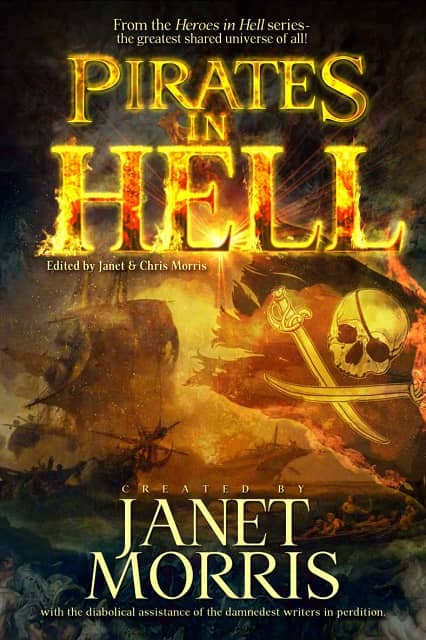 |
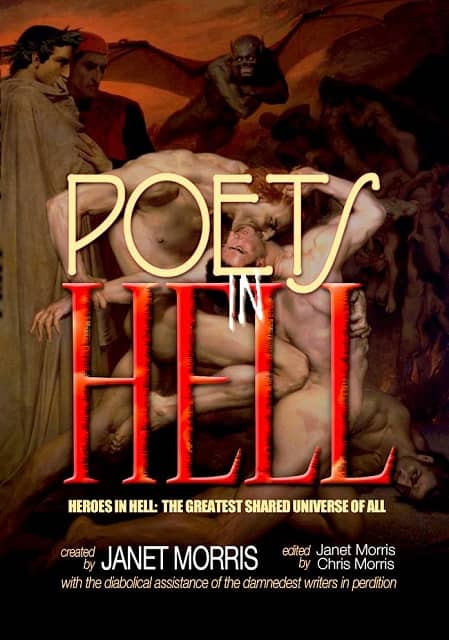 |
Villon scuffed closer to Merrick. “Coward!”
“Gentlemen, I beg you: Leave off!” said Madge, stepping between them.
“He started it the moment you walked in here,” said Merrick.
“And one day I shall finish it,” said Villon.
Madge pushed them apart. “Enough! Joseph is an old friend of mine, François, and you know there is nothing inappropriate between us.” She turned to Merrick. “I am truly sorry, dear friend. The heart wants what the heart wants.”
Merrick could never understand Madge’s love for Villon, nor Villon’s hatred of him. Heaving a resounding sigh, he said, “And your heart desires Villon.”
“What more can I say? Even in hell, where physical love is an act of pain and torture, there exists spiritual love, the love that transcends all space and time.” Madge kissed Merrick on the cheek and then frowned at Villon. “I will deal with you later, Francis.”
“Do not call me that,” said the Vagabond Poet.
Madge laughed and rolled her eyes. “I am your benefactress, Franky boy. So put away your little sword and escort me home. Joseph, we shall see ourselves out, thank you. And if you need more diablos, simply ask.”
Casting a hate-filled look at Merrick, Villon said, “Hell isn’t big enough for the two of us.”
“Unfortunately, we are both stuck here for eternity,” Merrick replied.
Sheathing his rapier with an angry flourish, Villon followed Madge Kendal like a faithful and chastised puppy. They left quietly, closing the front doors to Withering Blights behind them.
Merrick desired nothing more than to point his metal cane at Villon and send him to the Mortuary for reassignment. Instead, with a cry of rage, he threw the cane across the dining hall, and followed it.
There he turned and leaned against the hearth, staring at the cold ashes piled there, his heart aching with sadness, despair and the pain of unrequited love. With an agonized moan that could only come from the broken heart of a lost soul, the Elephant Man turned his attention to the stone gargoyles sitting on the fireplace mantle.
“‘Why was I not made of stone, like thee?’” he asked, quoting his friend and fellow lump of misshapen clay, the Hunchback of Notre Dame.
“But you weren’t, love,” said the sweet voice of a Southern belle from behind him.
Merrick spun around to face the entrance to the library. Framed in the doorway and holding a walking stick stood Antonia Ford, the beautiful and graceful daughter of a Virginia merchant and secessionist. During the American Civil War she had been a Confederate agent, spying for General Jeb Stuart and Colonel John Mosby. Health issues ended her life in 1871, whence she passed into perdition because her adventures in espionage had cost the lives of countless soldiers on both sides of that horrendous war.
Antonia and Merrick had met on the streets of New Hell City, where she begged for diablos and he tried in vain to earn his way as a true freak of Nature, not something made by the hand of the Undertaker. They had become fast friends, learning to depend on one another, and when Withering Blights was offered for rent, Madge helped them move in together.
“You’re awake, Antonia?” said Merrick. “How long have you been standing there?”
Antonia Ford smiled at him, gorgeous in her rose-colored, crinolined gown with its huge black velvet bow. Dark hair, long and curly, framed her lovely face. And although no true sun ever shined in the crimson vault over hell, and no need for such things indoors, she wore a pair of dark, wraparound sunglasses.
“Long enough to hear most of the conversation between you and your guests, my dear,” she said. “I must tell you, Joey… Villon is dangerous and not to be trusted.”
“I know. What about Madge?”
Antonia smoothed a wrinkle in her dress. “Although she is kind and generous, she is an actress and shall certainly come to more than one bad end, I fear.”
Merrick nodded, overcome with sadness and worry, for Antonia was usually right about such things.
“Now, my English beau, pick up that weapon I heard you throw across the room and let’s be on our way. You don’t want to be late for our doctor’s appointment, do you?”
His noisy alarm clock rings, and Doctor Victor Frankenstein, lathered in sweat, wakes from his latest nightmare. He glances at the always unreliable, taped-together digital clock on his bedside table. It reads: 13 O’clock.
What the f—? Maybe I should get a hell-rooster!
Victor rarely sleeps, but lately when he does he dreams of Erra and his Seven, the Sibitti, the plague-god’s henchmen who wreak havoc throughout infernity, unleashing ever more plagues, pestilence and floods. He wonders if any damned soul in the underverse really sleeps. Do they need to? Do they dream? After all, they are dead, and the dead really have no need of such things as sleep and dreams. They are in hell, which is in itself one everlasting nightmare.
We are merely ghosts in an infernal machine. Would that all this were a bad dream!
Rising from the cold, uncomfortable couch in the library next to his cinematically-inspired laboratory in Goblin Manor, Doctor Frankenstein prepares for a new “day” in hell, although time in hell lurched and crawled and sped, no more dependable than geography or weather. Donning torn and faded blue jeans and a tie-dyed t-shirt, he studies himself in the cracked mirror hanging on one wall.
His face, which is all scarred and stitched together, stares back at him. His neck-bolts need polishing. The rusty clamps holding in place the chicken wire that in turn holds in place his exposed brain also require polishing. His brain resides inside the skull of Adam, the giant he designed, built and brought to life, all in defiance of those Above. His former body now houses the brain of the creature once known as Frankenstein’s Monster.
What a trade off!
Considering all he’s been through, Victor is happy that his sardonic humor remains firmly intact. He wonders whatever became of Adam and his inamorata, Galatea. Last he’d heard, they had returned to Brimstone, Hellizona and their little tavern, Pitt’s Pendulum. Victor hopes they survived the plagues, the floods and Satan’s latest purge, or whatever it is. He has been having weird dreams ever since his release from his tour of duty in the Mortuary. Since working there, seeing and experiencing and following orders, his nightmares are unsettling and populated with reanimated corpses feasting on the flesh of the living dead.
After his epic failure to sail out of hell aboard the steamship Snark, the three Furies remanded both him and Quasimodo to hard labor for the Undertaker and his Deputy Assistant, Gorgonous. They helped reassign the overwhelming number of damned fools sent to the Mortuary by way of the plagues and floods sweeping through all circles and levels of the multifarious hells. The other survivors of the Snark’s ill-conceived voyage in futility had left the Isle of the Damned and returned to New Hell; His Satanic Majesty, surprisingly, proved true to his word on that point.
But Victor knew Satan all too well, and knew that the Adversary always had an ulterior motive. It was all a matter of when, not if, the Father of Lies chose to make another move in whatever game he played, and the mad doctor believed he knew the nature of that game: the purging of the damned from hell in order to leave the netherworlds to him and his Fallen Angels. Victor knew in his cold, dead heart that Satan wanted to prove to the Almighty that Mankind was worthy of neither damnation nor salvation… only obliteration.
A sudden pounding on the front door disturbed Victor’s reverie. “Quasimodo! Answer the damned door!”
Victor donned his stained and dirty lab coat and continued musing.
Upon returning to their mansion on the Golem Heights, Victor and Quasimodo discovered that hell remained in a state of instability. Although the flooding had slowed, the rising waters falling back to previous levels or returning to rivers and lakes gone dry, hell had definitely changed. There was now more an air of fear and despair so palpable it could be felt down to the core of Victor’s lost soul. Many of the damned had gone missing. Many lovers suffered separation or worse, while lovesick survivors sought obliteration but couldn’t find it. As damned souls disappeared, what they knew disappeared with them. Love, hope and the promise of opportunity had been lost to New Dead and Old Dead alike, and the purges yet raged, unabated.
A soft knock on the library door and the squeak of hinges opening announced the arrival of the Hunchback of Notre Dame. Victor put on his stocking cap and turned around.
Quasimodo stood framed in the doorway, dressed like a villain from an old cowboy movie. He sported a ten-gallon hat, a plastic water pistol and a stiff new lariat.
“Why are you dressed all in black?” asked Victor.
“Because sometimes the good guys, they do not always wear white,” Quasimodo replied with a poor attempt at a Texas accent.
“Well who in hell are you supposed to be this time? The Quasimodo Kid?”
“No, mon partenaire. I am the Hopalong Hunchback.”
Victor chuckled and shook his head. Quasimodo’s dress-up and play-acting never ceased to amuse him. “So who was at the door?”
“Our guests: Madame Antonia Ford and Monsieur Joseph Merrick.”
Walls the color of freshly-spilled blood hold racks of scientific instruments, a jumble of research equipment, electrical panels, and a hodge-podge of esoteric apparatus: all these and more make up Doctor Victor Frankenstein’s Goblin Manor laboratory. Illumination provided by torches jammed into wall brackets conjures forth twisted shadows that dance across the vaulted ceiling or hide in cobwebbed corners. And there, seated upon the examination table, the Elephant Man confers with the Monster Maker, his physician. Still wearing her dark sunglasses and awaiting her turn with the doctor, Antonia Ford sits quietly at Victor’s desk, while Quasimodo hovers nearby, watching Frankenstein examine Merrick.
“What is your prognosis, Doctor?” asked Antonia.
“Please, call me Victor, my dear. After all, it is love and friendship that bring us here together. There should be no formalities between friends.”
Antonia laid a hand upon her heart. “Thank you, Victor.”
When Frankenstein finished examining him, the Elephant Man asked, “Do you think you can help us?”
“Giving you a new body may not be something I can do here in hell,” Victor replied.
“But you succeeded once before, Doctor,” said Merrick.
“That was on earth, in life, Joseph. And remember, Adam’s body — this body which I now inhabit — was already dead. I pieced it together from various parts taken from a number of fresh cadavers. The brain, too, was dead… until I gave it life. Here in hell, revivification is a different matter.”
“How is that, my friend?”
Victor rubbed his chin, taking a moment to think. “For one thing, so-called dead bodies do not stay dead. They expire and disappear in the blink of an eye, only to reappear in the Mortuary for reassignment. Only there, in the Undertaker’s domain, do bodies and limbs hang about like so many spare parts waiting to be used.”
“More like fresh meat in cold storage, waiting to be butchered,” Quasimodo quipped.
Glancing at his humpbacked assistant, Victor gave a weak sigh and acknowledged Quasimodo’s analogy with a brief nod. He shuddered at the memory of his one and only time on Slab A, when the top of his skull had been removed by Gorgonous, the Undertaker’s bizarre assistant. Even he, the infamous Doctor Frankenstein, had found his later servitude to the Undertaker a most ghastly experience, and one he would not soon forget.
Oh, how I hated that slaughterhouse, that foul abattoir of torture, torment and utter misery. “I cannot rob the Mortuary as I once robbed graves,” said Victor.
“I understand,” Merrick replied. “But here you switched your brain with Adam’s brain, and the procedure succeeded. Neither of you perished and ended up in the Mortuary. How was that accomplished without the repercussion of reassignment?”
“That was all Merlin’s doing, Joseph… an experiment conducted in lieu of payment for building Adam and me an enchanted hiding place. Merlin used some form of magic that kept our necroflesh bodies in a state of suspended animation while he switched brains from one body to the other. How he managed this, I have no idea. A magician never reveals his secrets.”
Antonia adjusted her sunglasses and said, “Then we must find Merlin.”
“Alas, I wish we could find him,” said Quasimodo. “But he has disappeared — vanished like the volunteer in a stage magician’s act. No one knows where he has gone.”
“Believe me, Antonia, we spent an eternity looking for him,” said Victor.
Quasimodo nodded his shaggy head. “No one has seen the magician since the flooding of hell began.”
Merrick’s hang-dog expression touched Victor’s emotions. He wanted to help the Elephant Man. He wanted to ease the pain and suffering of all the damn souls throughout hell. More than that, he wanted to rub his success and defiance in the face of His Satanic Majesty, whom he considered no more majestic than a rotten turnip.
Victor disapproved of the games Satan played on the damned; and apparently the Almighty disapproved of the way Satan ruled hell, which is why those Above dispatched Erra and his brood to hell: to make infernity more hellish. Victor did not like those heaven-sent auditors, either.
“So there’s no hope for me, is there?” asked Merrick. “I must forever be trapped inside this twisted mass that is my body?”
“Give me time, Joseph,” Victor said to him. “Let me think on this. I’m sure I can do something for you. How much? That I do not know.”
“A little something is better than a lot of nothing, I suppose.” Merrick let out a deep, ragged breath of hopelessness. “And what about Antonia?”
Rising to her feet, Antonia grabbed Merrick’s metal cane and used it to help her across the room. Victor smiled: he had designed and built that cane especially for Merrick, with its custom-made handle and the secret button concealed within its pistol-like grip.
“Do you think I will ever be able to see again, Victor?” Antonia removed her sunglasses, revealing two black and empty sockets where eyes should have been.
“Mon Dieu!” cried Quasimodo. “I knew of your blindness, but had no knowledge of how the torment had been inflicted on you.”
“In life, I was a spy. Here in hell, I once spied for Guy Fawkes,” Antonia explained. “If he had a hand in the destruction of the original Hellexandrian Library, I will not say. When apprehended, I endured torture by agents of Satan, who sent me to the Undertaker when I refused to talk. He removed my eyes so I could never again spy for anyone.” She donned her sunglasses once more and leaned on the cane. “If I must settle for a pair of glass eyes, then so be it. At least I won’t have to wear these ridiculous spectacles anymore.”
“You look like the movie star, Mademoiselle,” Quasimodo told her.
“You are most gracious, my friend. Thank you.”
Victor admired her resilience, her realistic outlook, and the overwhelming power of hope she nurtured not only for herself, but for Merrick as well. Victor needed no x-ray machine to see her heart filled with love for the Elephant Man. “If I can find a way to help you and Joseph, I will, Antonia. That is all I can promise you.”
The Elephant Man sighed, nodded, and then a mischievous twinkle brightened his eyes. He wrapped his good left arm around the shoulders of Quasimodo and patted the bell ringer’s hunched back. “You know, my friend, Victor is a very fine doctor and can help you, too. Perhaps you should let him do something about your hump?”
“What hump?” Quasimodo asked without missing a beat.
The two old friends burst into merry laughter, which helped disperse the pervasive gloom in the laboratory.
Victor shook his head in disgust. Young Frankenstein, a movie he detested, was a favorite film of both Quasimodo and Merrick; they had seen it together at Gremlin’s Sinese Theater in Hellywood. “For your information,” Victor said bitterly, “I never had any sons and thus no grandchildren. All those films took great liberties with my life and my work, treating me like a ghoul, a rapist and a lunatic. I am a doctor, damn it — not a murderer!”
“But I was turned into a cartoon — a cartoon!” Quasimodo wailed as if being tortured. “And it was a musical, of all things!”
“Forgive us, Victor,” said Merrick. “We did not intend for our little joke to upset you. Liberties were also taken in the play and film made of my life.”
“Yes, yes. No harm done. No harm done at all,” said Frankenstein, his thoughts already racing down another road.
Merrick shook his head. “I am still new to hell. There is much I have yet to learn. Things I assumed to be basic truths while alive I now discover were all lies.”
“And lies, dear Joseph, often serve as truth, here in hell,” Antonia told him. She had more experience in hell than Merrick, having passed from life in 1871, whereas he entered hell in 1890. “The afterlife is one paradox after another, as confounding as life itself.”
“What about transplantation?” Merrick asked a moment later, a hopeful note in his voice.
A bewildered look wrinkled Antonia’s lovely face. “What are you talking about?”
“New eyes and new limbs, Antonia,” Merrick told her.
Victor’s eyes grew wide and fever-bright. Gleefully he rubbed his hands together. “But of course! Of course!”
Quasimodo snapped his fingers. “Grave robbers and body-snatchers, mon ami.” The hunchback puffed himself up with pride and turned to Victor. “For spare body parts we must go to see Messieurs Burke and Hare.”
This is an excerpt from Joe Bonadonna’s “Withering Blights”
as featured in Lovers in Hell, edited by Janet Morris and Christopher Morris
Copyright © 2018, Perseid Press.
First Kindle edition September 2018, all rights reserved. ISBN 978-1-948602-20-4.
Joe started writing songs and stories in 1970, and sold a few short stories in the early 1980s. So far, he’s published four books: the sword and sorcery collection Mad Shadows: The Weird Tales of Dorgo the Dowser, published by iUniverse; the space opera, Three Against The Stars, published by Airship27; Waters of Darkness, a sword and sorcery pirate adventure, in collaboration with David C. Smith, and published by Damnation Books; and Mad Shadows II — Dorgo the Dowser and The Order of the Serpent, published in trade paperback and digital formats in January 2017.
His first sword and soul story, “The Blood of the Lion,” appeared in GRIOTS 2: Sisters of the Spear, from by MVmedia.
Joe’s Dorgo the Dowser novelette “The Moonstones of Sor Lunarum” appeared in Black Gate in December 2011, and it has proven to be one of the most popular stories we’ve ever published. Another novellas featuring Dorgo, “The Book of Echoes,” appeared in the 2013 anthology Azieran: Artifacts and Relics from Heathen Oracle, and the novella “The Order of the Serpent” is scheduled to appear in a special sword and sorcery edition of Weird Tales online magazine.
Joe has also written a number of articles and book reviews for Black Gate online magazine.
Photo by Erin Lynn Ransford.
Click on the photo for a large version.
